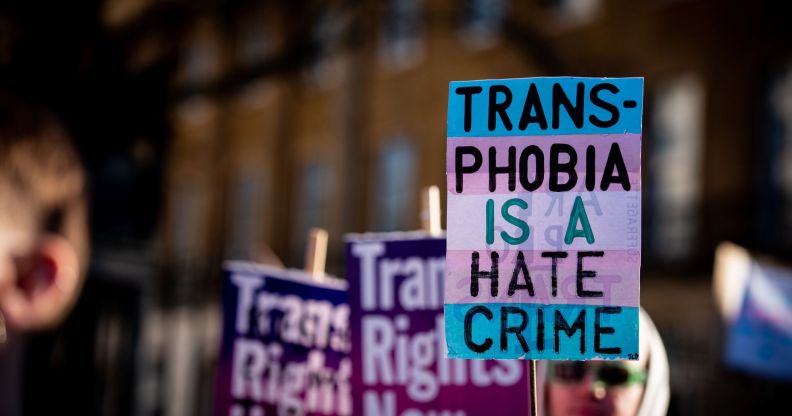EHRC is ‘harming’ trans community and is a ‘failed institution’, LGBTQ+ groups warn

Police are investigating twin toddlers being attacked in a “transphobic-motivated hate crime” that was directed at their trans dad. (Getty)
Several prominent UK charities have described the Equality Human Rights Commission (EHRC) as a “failed institution” after it advised changing equalities laws to make sex refer to biological sex – a move that would have a devastating effect on trans rights.
A coalition of nonprofits spearheaded by LGBTQ+ advocacy organisation Stonewall wrote an open letter to leading human rights network the Global Alliance of National Human Rights Institutions (GANHRI) to review the EHRC for “failing to meet its basic duties.”
Published last Wednesday (3 May), the letter informs officials that the charities believe the EHRC works in a way that “is hostile to the rights and dignity of trans people.”
Charities that signed the letter include but are not limited to the LGBT Consortium, Mermaids, The Kite Trust, Trans Actual, and Trans in the City.
“We are conscious that the voices of civil society and of the Subcommittee have not thus far been enough to convince the EHRC to change its course,” the statement added.
The EHRC has been criticised for its regressive stance on trans equality in the UK after it deemed ‘gender-critical’ beliefs to be protected under the 2010 Equality Act in 2021.
The body, which is led by current chair Baroness Kishwer Falkner, faced mass resignations in February 2022 after current and former staff described the public body as “the enemy of human rights.” and criticised its stance on trans issues.

The EHRC advised changing the legal definition of sex to ‘biological sex’
Most recently, the EHRC published a letter to equalities minister Kemi Badenoch advising that the 2010 Equality Act be amended to define sex as strictly biological.
The organisation claimed that changing the definition could result in “greater legal clarity” and would exclude “trans women from women’s sport.”
In response, Stonewall wrote in its letter that it believed the change was “unnecessary, unworkable, and unfair.”
“It represents an attempt to roll back rights that trans people in Great Britain have held for many years, and it risks significant harm to the community in their day-to-day lives,” the open letter reads.
The open letter pointed to quotes from members of the EHRC National Committees in Scotland and Wales, who said that the change in definition is “not the preferred course of action.”
“The Scotland Committee agreed that their preferred option would be to maintain the status quo as they do not consider sufficient evidence has been presented to justify amending the definition of legal sex.
“They advised gathering additional analysis, evidence and stakeholder views to better understand the implications and wider ramifications of such a change.”
As well as the concern surrounding attempts to roll back trans rights, the letter also expressed several concerns about the legitimacy of the EHRC’s work.
It cited a “lack of political independence” as just one of the issues it believed was preventing the EHRC from functioning as a human rights organisation, as well as “evidence of politicisation and institutional capture at the EHRC board level.”
Stonewall chief executive Nancy Kelley said: “The EHRC’s recommendations over the past year are extraordinary, in that they are designed to promote the exclusion of trans people, in particular trans women, from everyday public spaces.
“If they were made law, the EHRC’s changes would effectively force most trans people to de-transition, a situation that would shame our nation.”

